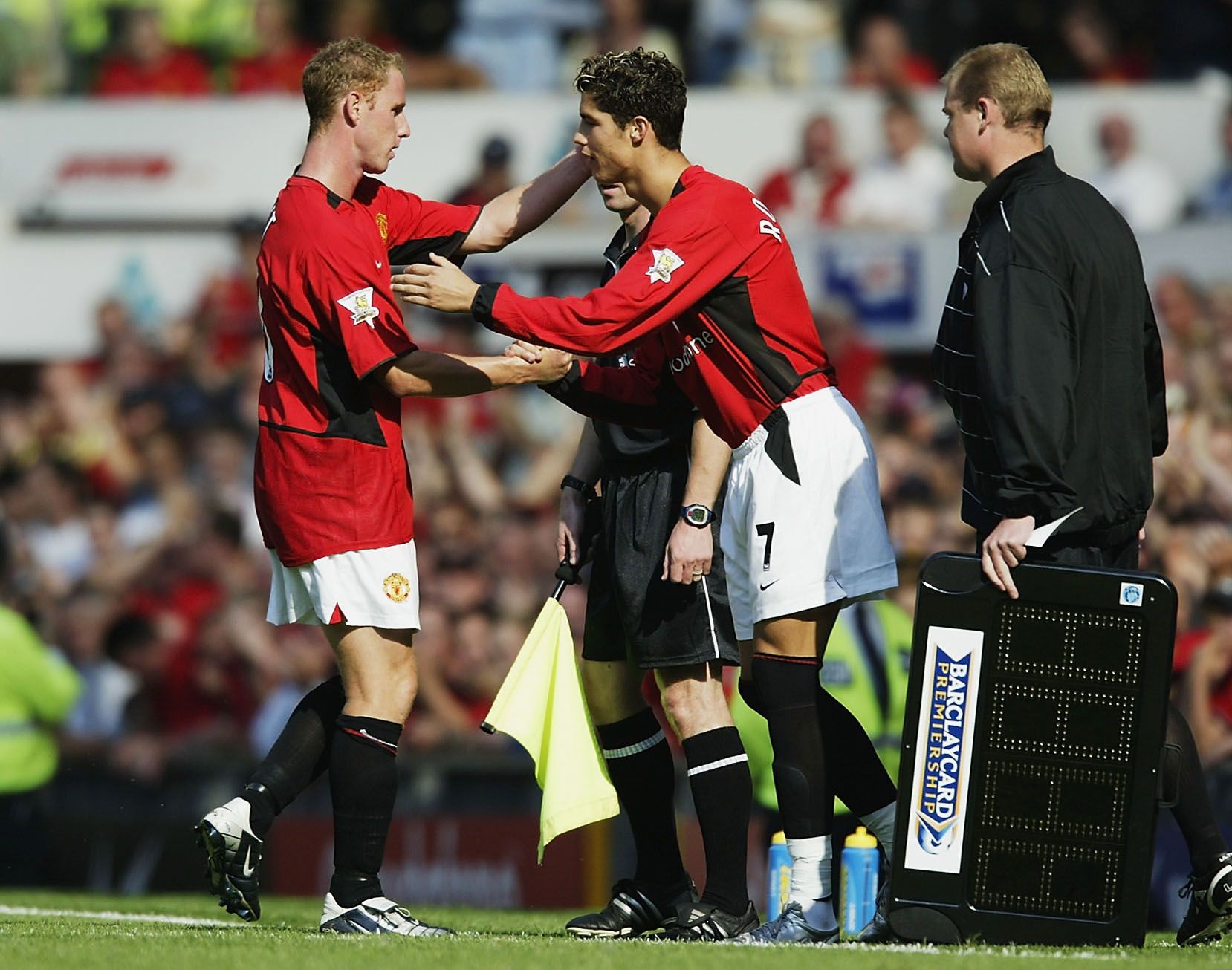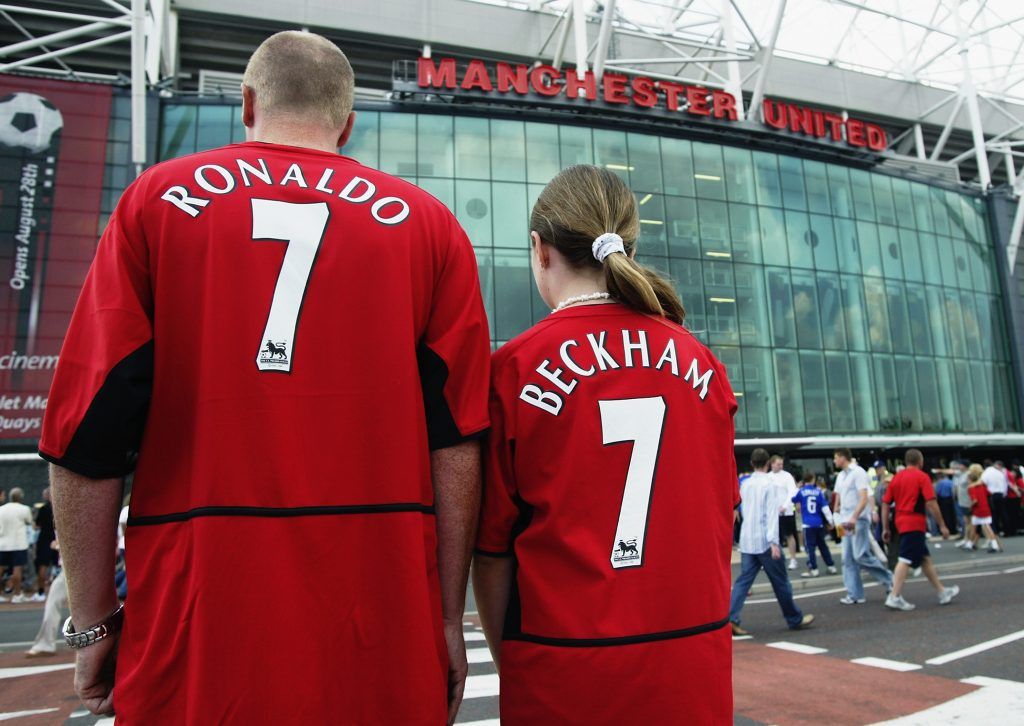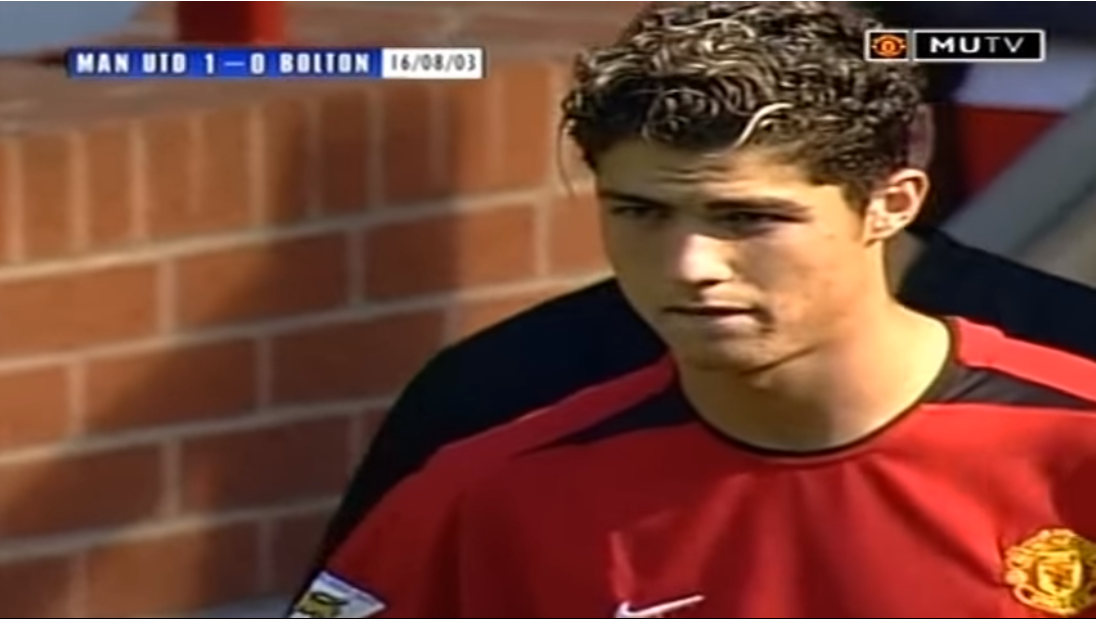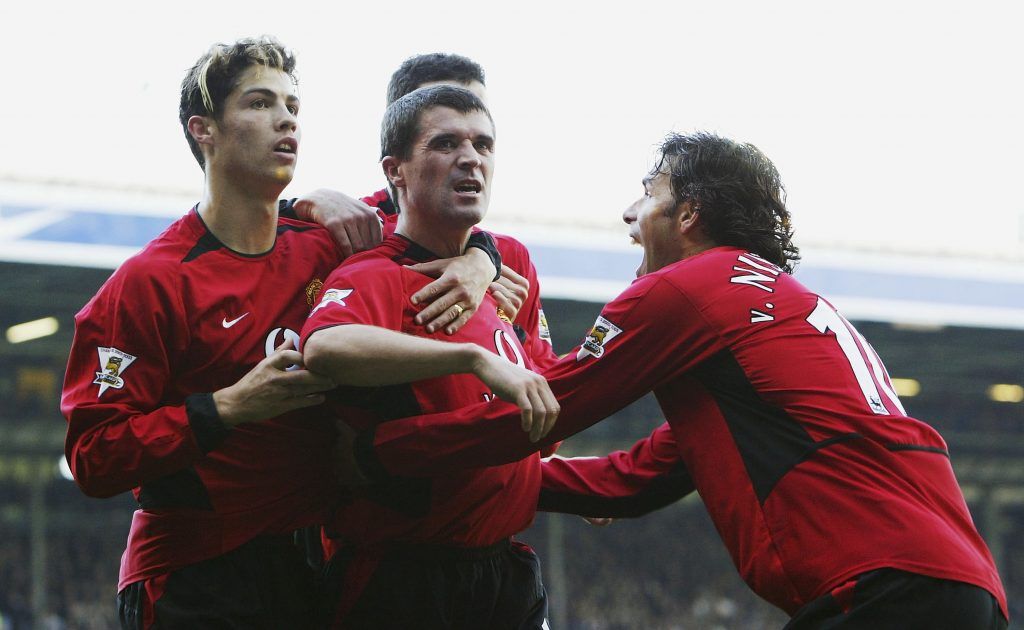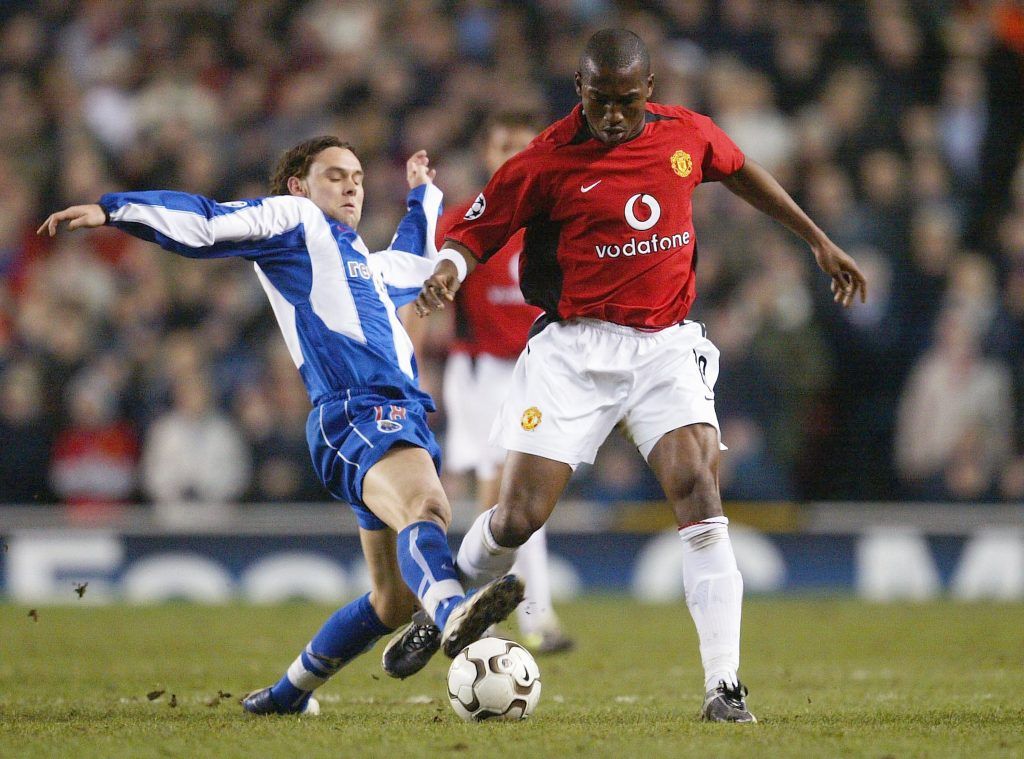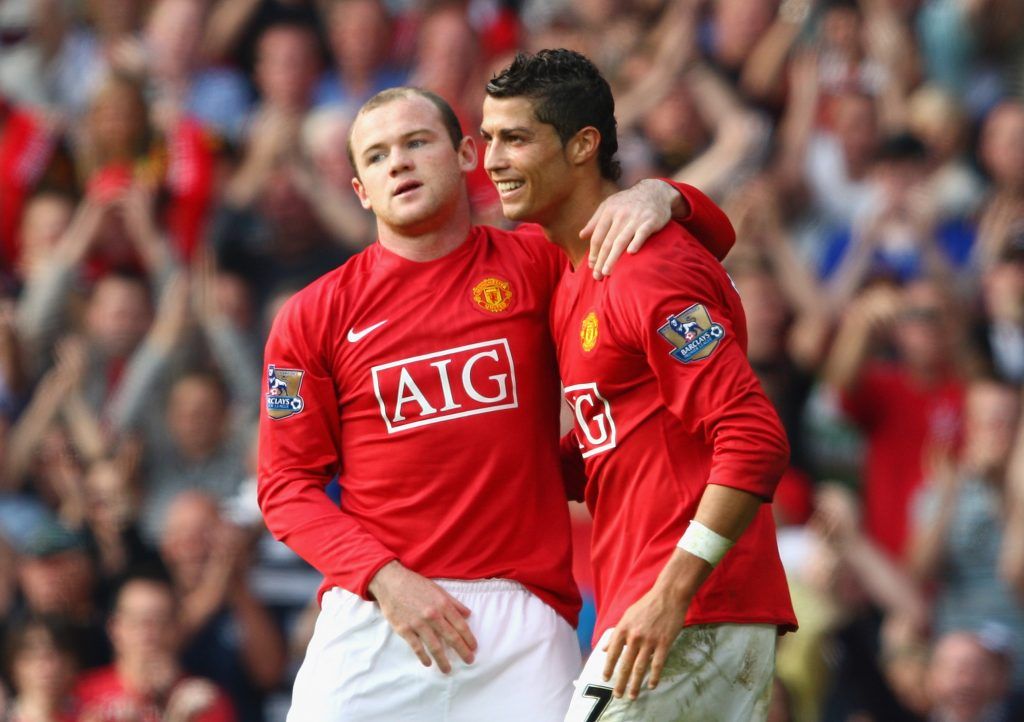“Everyone that played with him will feel pride that they played with him, and saw his emergence as one of the greatest of all time”
Cristiano Ronaldo made his debut for Manchester United on August 16, 2003, and it was obvious from his first few touches that he was a special player. United were leading 1-0, thanks to a Ryan Giggs free-kick in the first half, but were labouring against their uncompromising opponents. With 30 minutes left to play, Alex Ferguson called his new signing from the bench. Ronaldo had only arrived at Old Trafford just three days earlier.
In a summer dominated by players leaving United, frustration in the transfer market and Chelsea’s spending spree, he would prove the only bright spot and the catalyst for Ferguson’s last great team.
The Portuguese winger was 18, inexperienced and very raw. He had only made 25 appearances for Sporting Lisbon, scoring three goals. But his talent was obvious. The story of his performance in a friendly between United and Sporting has been re-told several times.
“We were playing Sporting Lisbon pre-season, to celebrate the opening of their new stadium, and I saw how good Ronaldo was that day,” Roy Keane recounts in his second autobiography.
“He was playing for Sporting and he was up against John O’Shea. Sheasy ended up seeing the club doctor at half-time because he was having dizzy spells; he was being twisted inside-out. The club had been watching Ronaldo, and I think they concluded negotiations after the game. We always joked with Sheasy that he’d sealed the deal by playing like a fuckin’ clown against him. In fairness to Sheasy, he was jet-lagged, like the rest of us.”
The players were so impressed by Ronaldo, they pestered Ferguson until the United manager signed him. However, the Scot claims that he was already aware of the youngster, after being tipped-off by his Portuguese assistant Carlos Queiroz. Ronaldo’s performance in the friendly convinced the United manager that they couldn’t waste any time in signing him up.
According to the Ferguson, watching Ronaldo that night was “the biggest surge of excitement, of anticipation, I experienced in football management.”
“I can still hear myself shouting at John, ‘Get close to him, Sheasy.’ ‘I can’t,’ came the plaintive reply” – Ferguson.
Ronaldo’s tremendous potential was evident. He was lightning quick and comfortable with either foot, with a full range of bewildering tricks and wonderful balance. He was also brave and possessed an acute intelligence, qualities which were on display when he came on as a second-half substitute for Nicky Butt against Bolton.
The 18-year-old, wearing the number seven jersey previously held by David Beckham, Eric Cantona, Bryan Robson and George Best, took up a position on United’s left-wing and was levelled with a tackle within minutes of coming on.
After collecting a pass from Keane, Ronaldo sidestepped Nicky Hunt only to be dispossessed with a scissor tackle.
However, despite his reputation for theatrics in his early seasons, Ronaldo got straight back to his feet looked for the ball again against Sam Allardyce’s uncompromising Bolton. This impressed Ferguson sitting on the sidelines.
“The Bolton defenders ended up in knots. The right-back rattled him straight away in the centre of the park, took the ball off him, but Cristiano got straight back up and demanded another pass right away. ‘He’s got the balls, anyway,’ I thought,” Ferguson said in his book.
It was this determination that set Ronaldo apart. It won the respect of his teammates, ensured he integrated and then excelled. Several talented players at arrived at United, only to falter, finding the demands too great, particularly in the post-treble seasons. Juan Sebastian Veron was one. The Argentine never integrated at Old Trafford and left for Chelsea just before Ronaldo arrived. Roman Abramovich spent £15m on Veron, who ended up playing 14 times for the newly-rich London club.
“There was talk during his time with us of Veron falling out with other players, but I don’t think he did, partly because he never spoke to anyone. He was alone in the dressing room. He didn’t speak the language. He wasn’t antisocial; he just wasn’t a communicator. I’d come in for work: ‘Morning, Seba.’ ‘Morning, mister.’ And that was it,” – Ferguson on Veron.
United had no such worries with Ronaldo. He was the club’s first Portuguese player, away from his home country for the first time in his life, and despite his talent, there were no guarantees he would succeed. Ricardo Quaresma, considered Ronaldo’s equal as a teenager, didn’t fulfil his potential upon making a move to Barcelona at the time. There were bumps along the way, but Ronaldo overcame every challenge, aided by his teammates at United.
He was the ultimate competitor, a facet of his character that would propel him to the top of the sport.
Against Bolton on his debut, the winger almost created United’s second goal when he was dragged down by Kevin Nolan in the penalty area after Keane played him in with a pass.
Ronaldo had ignited his team and the United captain ran straight to his young teammate to congratulate him before Ruud van Nistelrooy missed the spot kick.
“I liked the lad straightaway. He had a nice presence about him, and a good attitude. After the first few days, watching him train, my reaction was, ‘This lad is going to be one of the world’s greatest players.’ I didn’t say it publicly, because I’d always be wary of building a player up too early – or knocking him down. He looked like a player. You have to look the part, and he did. Zidane looked like a player – and Ronaldo looked like a player. The shape, the body language – they were there. A bit of arrogance, too. But he’d a nice way about him; he was very likeable… He was immediately one of the hardest working players at United. Most of the players I knew worked hard, but Ronaldo had the talent on top of the work rate,” Keane on Ronaldo.
Ronaldo then helped set-up United’s second goal, beating the Bolton full-back with ease, he floated a cross to the back post on his supposed weaker foot that landed with Scholes. Giggs tapped home Van Nistelrooy’s rebound, his second of the day.
Scholes made it 3-0 and Van Nistelrooy got his goal to wrap-up a productive day for Ferguson’s side.
“Of his own volition, Ronaldo moved out to the right-hand side and hit two superb crosses in… The crowd on that side of the ground responded as if a Messiah had materialised right before their eyes. The Old Trafford crowd build up heroes quickly. They see someone who gets their rears off seats and take to them right away. Ronaldo had the biggest impact on Manchester United fans of any player since Eric Cantona. He could never have matched the idolatry that came with Cantona, because Eric had all this defiant charisma, but his talent was instantly apparent,” – Ferguson.
Following the match, Ronaldo was all anyone to talk about. Ferguson said the United fans “have a new hero”. He added: “It was a marvellous debut, almost unbelievable. But we have to be careful with the boy. You must remember he is only 18.”
Allardyce said the young Portuguese winger “changed the game” and that, “on the basis of that 30 minutes, he’s going to be a very exciting player in this league”.
Even the previous United number seven offered his thoughts on Ronaldo. Beckham, back in England on international duty a few days after the game, conceded that it felt strange to see another player wear the jersey. But the England captain said that his old club “are lucky to have a talent like that; the fans and the players realise that already.” There was a sense that United had struck gold in an otherwise challenging summer.
After his relationship with Ferguson became irreversibly fractured, Beckham joined Real Madrid for £25m a few weeks before Ronaldo’s arrival. United spent most of the summer chasing Ronaldinho, who came close to signing before opting for Barcelona, who had spent the summer promising to land Beckham. Over the next three years, Ronaldinho would become the best player in the world and help Barca win their second European Cup. United also lost out on Harry Kewell to Liverpool, which wouldn’t prove as costly.
Ferguson cut his losses with Veron and took several risks in the market. David Bellion cost £2m from Sunderland. Eric Djemba Djemba arrived for £3.5m from Nantes. Tim Howard cost £2.3m from the MetroStars in MLS and Kleberson, a World Cup winner with Brazil, joined for £5.93m from Paranaense. None of these gambles paid off.
United were about to enter a fallow period. In his second autobiography, Ferguson has a chapter dedicated to the time between summer of 2003 and the beginning of the 2006/07 season, titled, “The lean times.” Gary Neville’s description is more appropriate. According to the former United defender, these were the “Djemba Djemba years.”
United went from dominating English football and being champions of Europe, to winning just the FA Cup and the League Cup in a four year period. Ferguson’s position was questioned by many and the club was bought by the Glazer family in a highly contentious sale that shook the fanbase. Keane departed in explosive fashion in November 2005. Arsenal became the Invincibles and Chelsea were bought by Roman Abramovic. After Abramovich fueled a spending spree that would break United’s grip on English football, Jose Mourinho guided Chelsea to back-to-back Premier League titles.
It looked as though Ferguson had lost his touch and United would never regain their top spot. They didn’t emerge from this slump until Ronaldo and Wayne Rooney began to hit their prime in the 2006/07 season.
When he developed physically and matured, Ronaldo became unstoppable, turning from tricky winger to powerhouse forward. His skill, technique and intelligence were evident from the start, and even in the difficult two seasons that followed, but he had to
“His first couple of years at the club were challenging,” Neville told JOE. “Because he was displaying all the hallmarks of a young player who hadn’t matured who didn’t have the right decision making the right physical growth. The physical change in him after four or five years was unbelievable. He went from being somebody who wasn’t physically developed suddenly to someone who looked like a super middleweight boxer.
“He hadn’t matured in many ways and that first two years were a real challenge. You’re thinking, ‘can he mature can he make the right decisions can he physically cope with the Premier League? Will he be able to step up and make the right decisions? Will he know when to pass it or when to cross it or when to release the ball?’ Eventually, it just clicked.
“What he’s done in his career is just incredible. Everyone that played with him will feel pride that they played with him, and saw his emergence as one of the greatest of all time.”
When it clicked, United regained their top spot in England and European football. Ronaldo was the catalyst and centrepiece of Ferguson’s last great team. The result against Bolton was a false dawn for United’s season – they won the FA Cup but finished third, 15 points behind champions Arsenal – but it was a glimpse of what was to come from Ronaldo. James Lawton summed it up best when he wrote in his match report that, watching Ronaldo, “was a bit like looking at the first page of a book you know is going to be a classic.”

